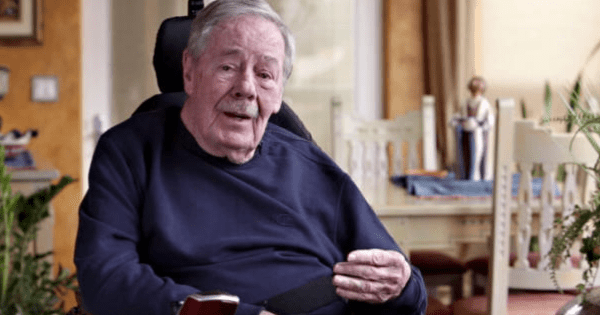Video by Former New Mexico Cabinet Member with ALS Urges Passage of Medical Aid-in-Dying Law
Former Secretary of Human Services Dept., Bill Johnson, Makes Impassioned Plea to Pass End of Life Options Bill
Mar 11, 2019 Elizabeth Whitefield End of Life Options Act New Mexico

(Albuquerque, NM – March 8, 2019) A former Secretary of the New Mexico Human Services Department, Bill Johnson, has recorded a video for Compassion & Choices to urge state lawmakers to pass a law that would expand end-of-life care options in New Mexico.
The video is released as legislators in New Mexico consider the Elizabeth Whitefield End of Life Options Act (HB 90/SB 153), a bill that would allow mentally capable, terminally ill adults with six months or less to live the option to get a doctor’s prescription for medication they can decide to take to die peacefully if their suffering becomes intolerable. To view video, click on this link: https://youtu.be/Efv-kbxfGvk.
Bill was diagnosed with Amyotrophic Lateral Sclerosis (ALS) in 2017. The life-shortening neurodegenerative disease, also known as Lou Gehrig’s disease, has no treatment or cure. The illness destroys nerve cells and robs people of their ability to use their hands, to walk, talk, swallow and eventually breathe.
“The prognosis is you live two to five years and then you die,” says Bill in the video. “I feel that at 83 and looking forward to maybe a terrible, terrible protracted agony, that just is not something that I want to go through.”
Bill served as New Mexico Secretary of the Human Services Department under Governor Gary Johnson and for more than 20 years as the CEO of University of New Mexico Hospital, the state's only academic medical center and primary teaching hospital for the University of New Mexico's School of Medicine. In addition, he served as a medical service corps officer in the Army.
Bill understands the positive impact that authorizing this compassionate option will have for terminally ill New Mexicans.
“My doctor and I have discussed this, several times, and he's aware of my personal feelings…… He is a supporter with that and has worked with the group promoting it right now,” he says in the video.“If I had just one minute to speak with the legislature, I would try to have them understand there has to be a solution to this prolonged disease that is so, so terrible.”
Bill hopes legislators relinquish any perceived ideologies and religious beliefs that force other New Mexicans to suffer from a terminal illness with no cure or treatment.
“I've talked to the family, and my wife, and kids, they understand how I feel, they are not disapproving, We're Roman Catholic,” he says. “Those individuals who think it's morally wrong and incorrect, I will try and help them understand how harrowing this disease is, how debilitating, how it takes everything away from you.”
Sixty-five percent of New Mexicans support medical aid in dying legislation, including 58 percent of New Mexican Catholics. And the vast majority (88%) of voters agree with the statement: “How a terminally ill person chooses to end his/her life should be an individual decision and not a government decision.”
“Mr. Johnson’s experience vividly illustrates the urgent need for expanding end-of-life care options that the majority of New Mexicans support,” said Elizabeth Armijo, regional campaign & outreach manager for Compassion & Choices. “We hope legislators listen to the voices of the majority of New Mexicans so they are not forced to suffer needlessly at the end of their lives.”
Last month, the New Mexico Senate Public Affairs Committee approved SB 153 for consideration by the Senate Judiciary Committee. The House Judiciary and the Health & Human Services Committees voted earlier in February to approve HB 90 for consideration by the full House. Prior to the legislative session, the city councils of Las Cruces, Santa Fe and Albuquerque voted on bipartisan resolutions in support of medical aid in dying.
Currently, eight jurisdictions have medical aid in dying laws: Oregon, California, Colorado, Montana, Vermont, the District of Columbia, and Hawai‘i. Nearly one-fifth of the nation’s population (19%) has access to this end-of-life care option.


